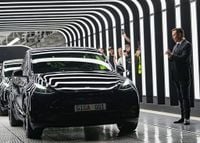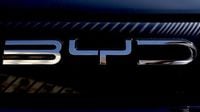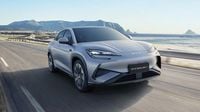Tesla and BYD are in a fierce battle for the title of the world’s largest electric car manufacturer, with the Chinese automaker making significant strides in 2024. As Tesla grapples with declining sales and stock prices, BYD has reported impressive growth in vehicle deliveries and revenues, positioning itself as a formidable competitor in the electric vehicle (EV) market.
In 2024, BYD sold a staggering 4,272,000 vehicles overall, significantly outpacing Tesla, which managed to sell only 1,789,200 vehicles. This marked a pivotal year for BYD, which reported a total of 1,764,992 battery electric vehicles sold, just shy of Tesla's electric vehicle sales crown. The competition between these two giants is set against a backdrop of evolving market demands and technological advancements.
BYD’s financial performance has also been noteworthy. The company announced a full-year revenue of 777 billion Yuan (approximately 99.3 billion Euros) for 2024, reflecting a remarkable increase of nearly 30 percent compared to the previous year. This surge allowed BYD to surpass Tesla's annual revenue, which totaled $97.7 billion (90.4 billion Euros) for the same period. Interestingly, while BYD's net profit rose by 34 percent to just over 40 billion Yuan (around 5.1 billion Euros), Tesla still retained a higher net profit of $7.1 billion (6.57 billion Euros).
Both companies derive about 80 percent of their revenues from automotive sales, but they have diversified their business models. Tesla, for instance, generates approximately 21 percent of its revenue from energy generation and services, including the sale of battery systems like the Megapack and Powerwall. In contrast, BYD has a lucrative side business in smartphone components, which accounted for about a fifth of its revenue last year.
The competition intensified further in 2025, as BYD reported delivering 986,098 vehicles in the first quarter alone, representing a 58 percent increase from the previous year. This included 166,109 pure electric vehicles and 205,310 plug-in hybrids. Analysts had anticipated BYD would sell around 1.03 million vehicles in the first quarter, but the actual figure fell short of those expectations. Meanwhile, Tesla is projected to have sold between 340,000 and 377,000 pure electric vehicles during the same period.
BYD’s ambitious goal for 2025 is to sell around 5.5 million vehicles, including 800,000 in international markets. The company is banking on innovative technologies to drive this growth, including new models based on its Super E-Platform, which boasts smart driving assistance and rapid charging capabilities that can provide up to 400 kilometers of range in just five minutes.
Despite these challenges, Tesla’s stock has faced its own turbulence. Since the beginning of 2025, the company’s stock price has plummeted by 30 percent, primarily due to concerns over CEO Elon Musk's involvement with the DOGE cryptocurrency and disappointing sales figures. However, following Musk's recent meetings in March, there has been a slight recovery in Tesla's stock.
Interestingly, BYD’s stock has been on an upward trajectory, reaching a record high in early March 2025. This surge was largely attributed to the announcement of new fast chargers that can significantly reduce charging times for electric vehicles. On the day BYD unveiled its Super E-Platform, Tesla’s stock took a hit, reflecting the growing competitive pressure from its Chinese rival.
The financial landscape for both companies continues to evolve, as they navigate the complexities of the global automotive market. While Tesla has long been considered the leader in the electric vehicle sector, BYD’s recent performance indicates a shift in dynamics that could redefine the industry.
As the competition heats up, both Tesla and BYD are likely to continue innovating and adapting to meet consumer demands. The race for dominance in the electric vehicle market is far from over, and with the stakes higher than ever, both companies will need to leverage their strengths to secure their positions.
In conclusion, the rivalry between Tesla and BYD highlights the rapidly changing landscape of the electric vehicle market. With BYD's impressive growth and Tesla's challenges, the coming years will be crucial for both companies as they strive for leadership in an increasingly competitive environment.






